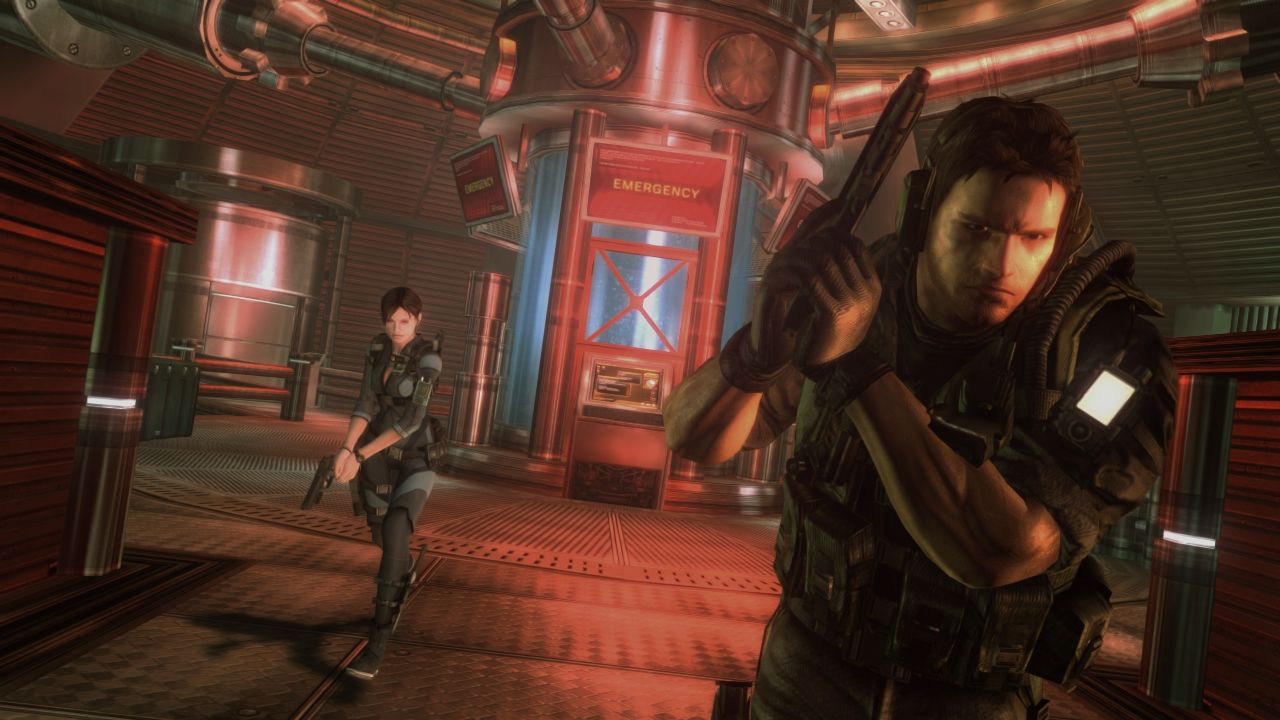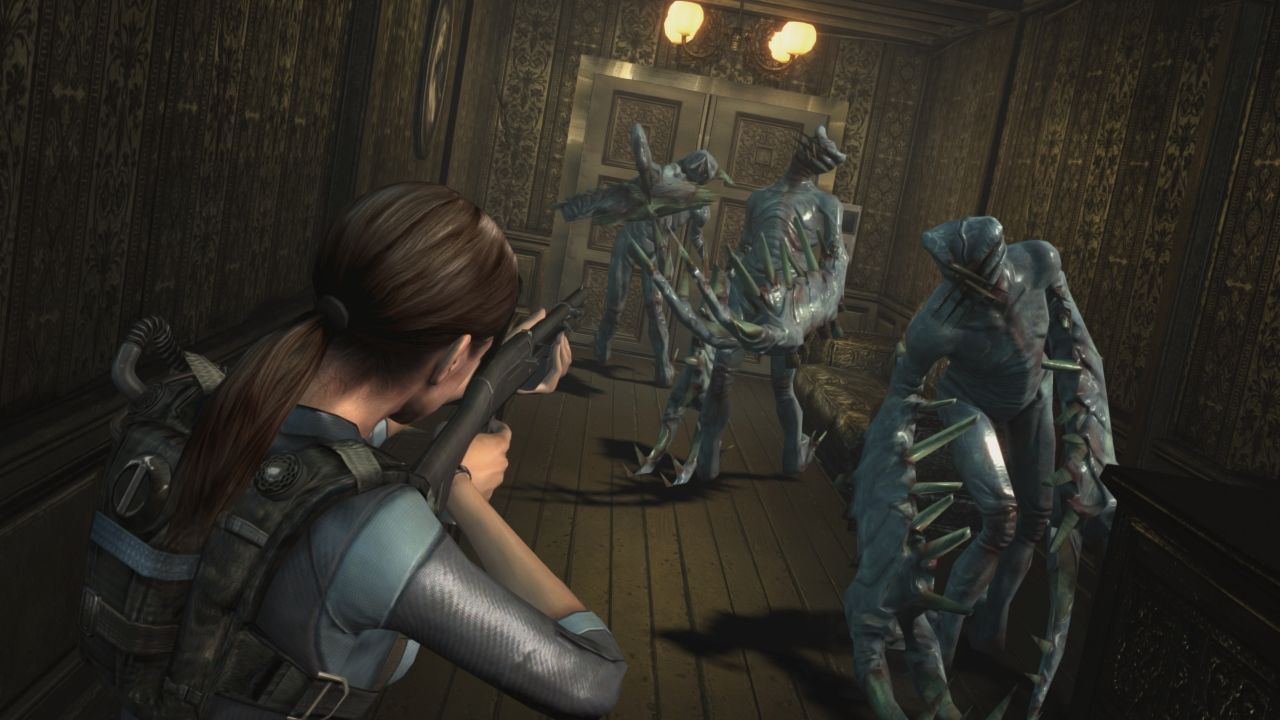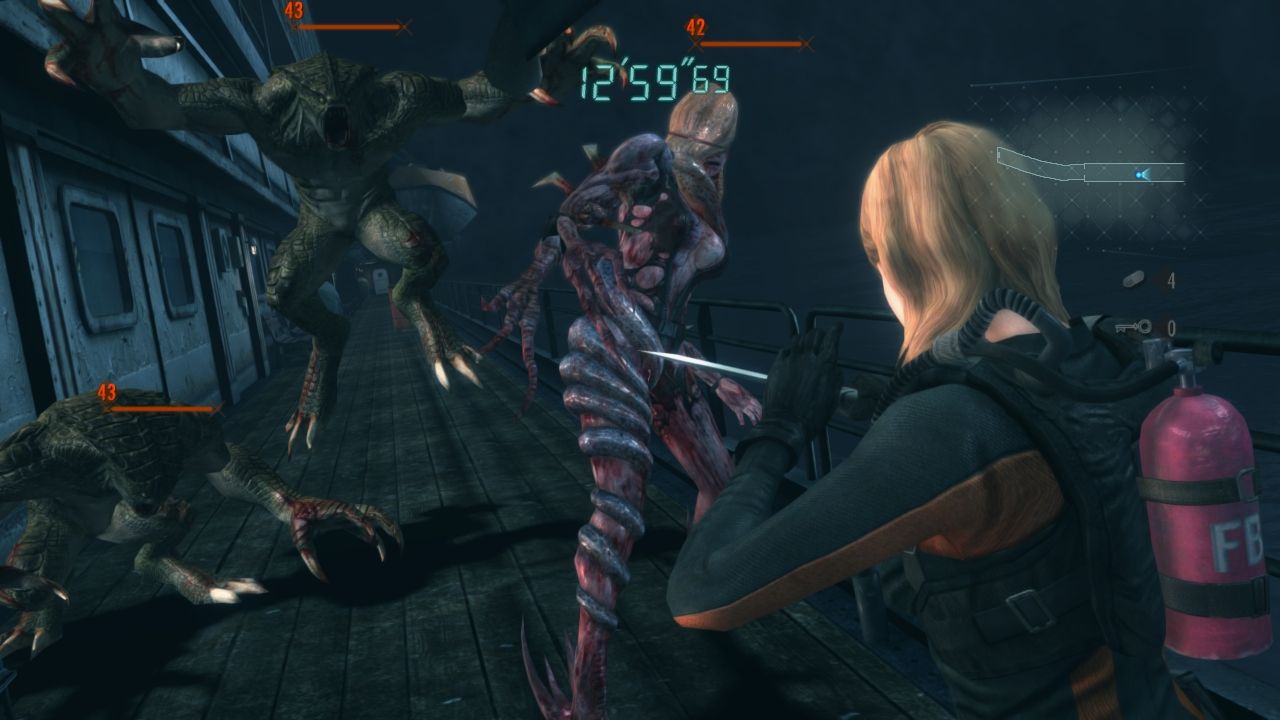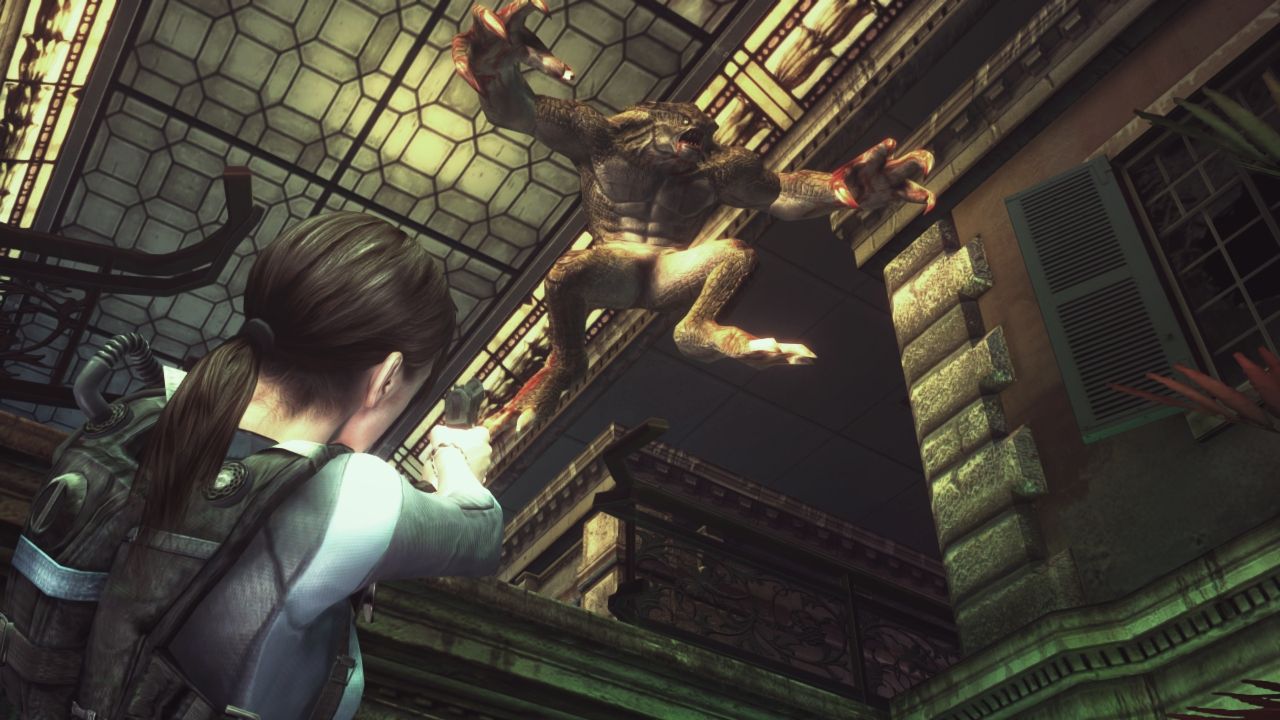Resident Evil: Revelations Review
With the release of every new Resident Evil title comes the promise of a step back to the series’ heyday, when a sense of dread filled every corridor and players cautiously and frightfully paced forward, both curious and fearful of what horrors lay in wait. The latest console release in the series, Resident Evil 6, failed miserably in this endeavor, providing a brief and frail attempt at an eerie atmosphere before quickly evolving the gameplay into firing rockets at choppers and taking down monsters the size of buildings. The latest entry in the series, Revelations, again tries to evoke the chilling atmosphere and tense encounters that propelled the series to fame in the nineties, but does it manage to finally bring the series back to the fans or is it just another nail in the coffin for survival horror?

Revelations was originally a 3DS game that was released last year and has now been given an HD makeover and ported to consoles. The game stars series veterans Jill Valentine, before she decided that blondes have more fun, and the man with the biceps, Chris Redfield. It takes place between the events of Resident Evil 4 and 5; the BSAA, the anti-bioterrorist group that was introduced in the fifth game, is in its infancy and Jill along with her partner Parker are sent to investigate after Chris goes missing during a field operation. The story isn’t told as one continuous narrative, but instead frequently switches between characters giving you each group’s recap of events. There are also flashbacks where you’ll take control of Parker, backed up by Chris’s new partner Jessica, and the game even introduces two entirely new characters, Keith and Quint, that get in on the action, albeit very sporadically. The story is rife with deception, twists and intrigue and is one of the more clever narratives to grace a Resident Evil game. It’s also a narrative that doesn’t take itself too seriously with Keith and Quint seemingly existing only for comedic value and some lines from Parker that would make even Barry Burton, master of cringe-worthy one liners, proud. The story is self-contained, so even those with no prior knowledge of Resident Evil’s expansive history can enjoy the tale as much as series die-hards, making it a perfect entry point for anyone new to the series.
The majority of Revelations takes place on board the Queen Zenobia, a luxury cruise liner overrun with bio-organic abominations. It’s a huge ship, but also a tightly contained location where you’ll meet many doors and inaccessible areas, meaning there’s a lot of running to and fro through a confined setting gathering keys and items in order to progress. A map is provided for easier navigation, highlighting your waypoint and objects of interest, but you’ll still find yourself utterly disorientated from time to time and stumbling aimlessly in the wrong direction. Despite the game being set predominantly in one location, the sections of the ship offer surprising diversity, from the magnificent ballroom to dark grimy service areas. The scaled down setting over previous instalments is an obvious consequence of the game’s origin as a handheld title, but also makes it one of the best settings to grace the series in years. Its claustrophobic corridors and sprawling intricate layout make encounters intense and exploration enjoyable. The ship’s sheer size and variety means it bears a very old-school feel and is a welcome resemblance to settings like that of the mansion in the first Resident Evil. Aside from the Zenobia you’ll also occasionally explore a fairly uninspired snowy mountainside and office-building interior that serve a much better purpose propelling the narrative forward than providing compelling surroundings.

Gameplay-wise Revelations feels most like Resident Evil 4; gone are the acrobatics of newer instalments in exchange for a more restricted control system. Against the majority of enemies, and in close quarters, the clunkier controls do a splendid job of creating intense and challenging battles, but in certain instances, especially some boss fights and quick enemies, the lack of a sprint feature can make combat feel unfair and unbalanced. The game introduces yet another new enemy type to the series, with the T-Abyss virus responsible for the latest outbreak. The basic enemies bear no resemblance to the traditional zombies the series is famed for and instead look and act more like they’ve wandered out of Silent Hill. Despite the new and considerably underwhelming enemies Revelations does find other ways to make the experience feel more like a modern take on an old Resident Evil game. Foes don’t drop supplies, meaning you’ll have to make good use of whatever health and bullets you find elsewhere throughout the levels. Ammo is rather scarce at times so no matter how skilled a marksman you are there will be occasions that you’re forced to avoid the enemy rather than defeat it. Herbs are again used for healing, only green can be found this time around, but your HUD doesn’t show a life bar and health doesn’t regenerate so you’ll have to be smart about when to use those precious herbs. As well as the more scaled back controls and limited supplies Revelations also provides a few subtle nods to the original game, such as a drainable murky bathtub and wall mounted shotgun that are sure to have long-term fans awash with nostalgia.
Revelations is not a difficult game, even though enemies can take a lot of punishment before going down, but combat is straightforward and controls simple. Checkpoints are frequent and well placed so you’re not forced to replay large sections should you find yourself out of your depth in a fight. However it’s managing your supplies efficiently that is key to success, so finding hidden items that grant you more supplies makes things a little easier. To pick up these extra items it’s necessary to scan the room using the Genesis, a special scanning tool. This device can be used to scan enemies too, which in return yields health rewards when enough data has been scanned. It initially feels like an intrusive chore as you’ll have to quickly get into the habit of performing a quick scan for items in every area, but becomes almost second nature as you progress. The extra supplies can be life saving, but the fact you must scan to locate items before you can pick them up feels rather gimmicky and unnecessary. Another new addition to the Resident Evil series is that characters can now swim, hardly a revolutionary new ability, but it does make sense for a game that is using the ocean as its main setting. What few swimming sections there are break up the gameplay nicely, as do the light puzzle elements used when unlocking certain doors. The weapon upgrade system has also been overhauled; players can carry up to three weapons that can be improved using customization kits found throughout the game. Any upgrades attached to weapons can be removed, which is great news for those adverse to commitment, and awards you the freedom to switch between loadouts without being penalized with inferior weaponry.

When playing Revelations it still very much feels like a handheld game, but there are some differences between the original release and its console cousin. Most notable of course are the graphics, which look amazing and, for the most part, are easily as impressive as those of Resident Evil 6. Some occasional sloppy textures serve as a stark reminder of the game’s beginnings, but they don’t deter form the experience in any way and it’s something the majority of players will barely notice. For those that don’t find the campaign challenging enough, Capcom have also added a new difficulty mode for the HD release. After completing the game Infernal Mode will be unlocked that not only ups the difficulty, but mixes up the locations of enemy types creating a much tougher experience. It’s a welcome addition, as aside from that there’s really no reason to replay the game unless you really need to see what’s behind a locked door you forgot to investigate the first time around.
While there’s little to entice you back to the campaign after the credits have rolled, as you progress through the game you unlock chapters in Raid Mode. This offers more of an arcade style gameplay, as you play through sections of the campaign levels. Players are scored on their performance and rewarded with points that are used to level up. Advancing in levels grants access to better weaponry and upgrades to further enhance your loadout. It’s an enjoyable addition, especially for those that prefer a more action orientated Resident Evil experience, and the progression system makes it quite addictive. The HD version also supports co-op play in Raid mode, which further adds to the enjoyment. This feature doesn’t support local play however, so if you want to buddy up to take on the infected horde you’ll have to do so online. It’s hardly likely to keep you coming back to Revelations for long but Raid mode does add more gameplay and challenge to the short and not overly difficult single player experience.

Revelations proves that a back to basics approach is what the series needs. Gone are the fancy control systems and constant over the top action, swapped for what feels much more like an old Resident Evil game revamped for a modern audience. While it never quite reaches the magnificence of its glory days, the dimly lit and confined corridors that make up most of Jill’s campaign provide a much more atmospheric experience than anything the series has recently produced. There’s a fine blend of action and suspense making Revelations a game that manages to provide a compelling modern experience but also stay true to its roots. It’s not perfect by any means, but is a step in the right direction for the series and the approach Capcom should take with every Resident Evil from now on.
